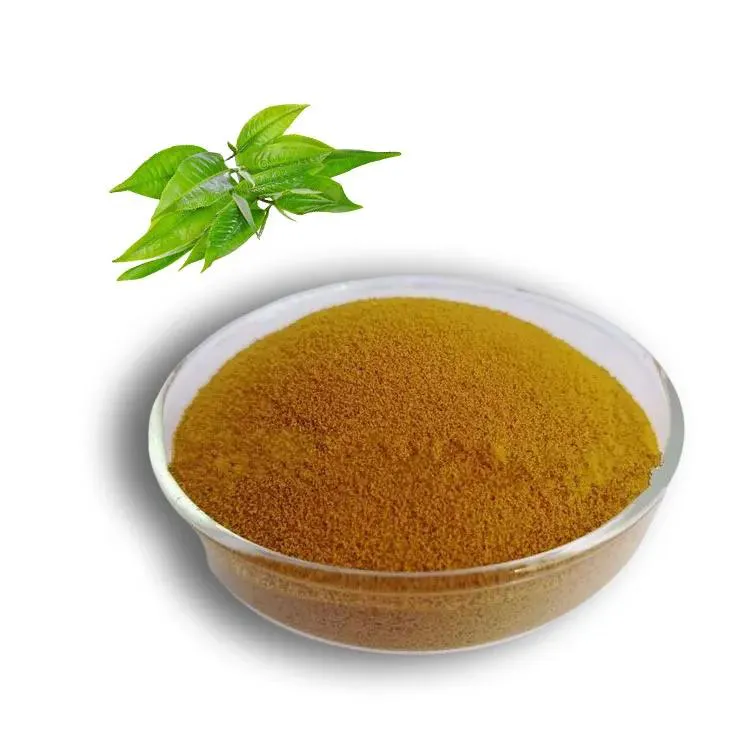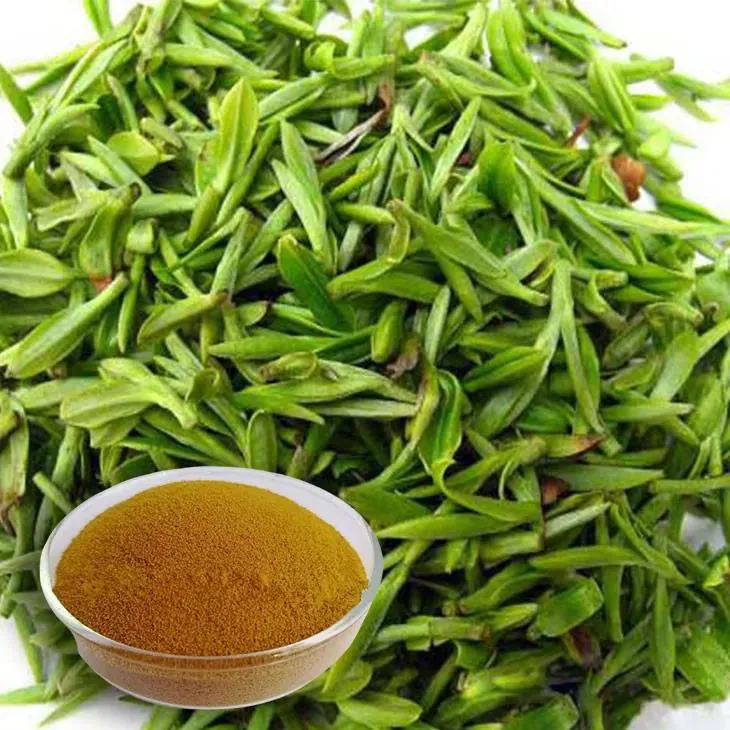- 0086-571-85302990
- sales@greenskybio.com
Green Tea Extract on Fatty Liver Disease: Benefits and Potential Concerns
2025-07-20

Fatty liver disease, characterized by the accumulation of fat in liver cells, is becoming increasingly prevalent worldwide. It encompasses conditions such as non-alcoholic fatty liver disease (NAFLD) and alcoholic liver disease, both of which can lead to serious health complications if untreated. Green Tea Extract, celebrated for its antioxidant and anti-inflammatory properties, has been studied for its potential benefits for various health issues, including fatty liver disease. This article examines whether Green Tea Extract is beneficial or harmful to individuals with fatty liver disease, supported by scientific evidence and practical considerations.
Understanding Fatty Liver Disease
Fatty liver disease occurs when excess fat builds up in liver cells, impairing liver function and potentially causing inflammation and scarring. It is often associated with obesity, insulin resistance, diabetes, and high cholesterol. Without intervention, fatty liver disease can progress to more serious conditions such as non-alcoholic steatohepatitis (NASH), cirrhosis, or liver cancer. A combination of lifestyle changes, including diet alterations and increased physical activity, is typically recommended to manage the disease.

Introduction to Green Tea and Its Extract
Green tea (Camellia sinensis) has been consumed for centuries, and its extract is rich in polyphenols, particularly catechins, which are powerful antioxidants. Epigallocatechin gallate (EGCG) is the most abundant catechin in green tea and is primarily responsible for its health benefits. These compounds contribute to green tea's potential effects in reducing oxidative stress, lowering inflammation, and enhancing metabolic function.

Potential Benefits of Green Tea Extract for Fatty Liver
Research suggests that green tea extract might offer several benefits for individuals with fatty liver disease through the following mechanisms:
Reduction in Liver Fat Accumulation
Studies have found that EGCG in green tea extract can reduce hepatic fat accumulation. By enhancing fat metabolism and decreasing lipogenesis (fat synthesis), green tea extract helps minimize liver fat content, improving overall liver health.
Antioxidant and Anti-Inflammatory Effects
The antioxidants in green tea extract help neutralize free radicals, reducing oxidative stress and inflammation in the liver. This action is crucial, as oxidative stress and inflammation can exacerbate liver damage and promote disease progression.
Improvement in Insulin Sensitivity
Insulin resistance is a common factor linked to the development of NAFLD. Green tea extract has been shown to improve insulin sensitivity, thereby aiding in the regulation of blood sugar levels and reducing liver fat accumulation.
Enhancement of Liver Function
Research indicates that the regular consumption of green tea extract may lead to improved liver enzyme levels, reflecting enhanced liver function and reduced liver damage.

Scientific Evidence Supporting Green Tea Extract's Role in Liver Health
The potential of green tea extract to benefit liver health is backed by numerous studies, including:
Animal Studies
Animal models have demonstrated positive effects of green tea extract on liver health, including reductions in liver fat, attenuation of liver inflammation, and improved liver function markers. These studies provide a mechanistic understanding of how green tea can influence liver health.
Human Studies
Clinical trials in humans have shown that green tea extract supplementation can lead to reduced liver fat, improved liver enzymes, and better metabolic profiles in individuals with NAFLD. Although results vary, these studies highlight green tea extract's potential benefits and safety for liver health.
Reviews and Meta-Analyses
Systematic reviews and meta-analyses of existing clinical data generally conclude that green tea extract may have favorable effects on liver health, particularly in reducing liver fat and improving liver function markers.
Practical Considerations and Potential Concerns
While green tea extract appears beneficial for fatty liver, several considerations are necessary for safe and effective use:
Dosage and Consumption
The benefits of green tea extract are dose-dependent. Consuming moderate amounts, as provided by dietary supplements or moderate tea consumption, is generally considered safe. Excessive intake can lead to adverse effects, such as gastrointestinal issues or interactions with certain medications.
Individual Health Status
Individual responses to green tea extract can vary based on health status, medication use, and genetic factors. Those taking medication or with pre-existing health conditions should consult healthcare professionals before using green tea extract supplements.
Product Quality
Selecting high-quality, standardized green tea extract supplements from reputable sources is essential to ensure purity, potency, and safety.
Integrating Green Tea Extract into a Liver-Friendly Lifestyle
For those exploring green tea extract as part of a fatty liver management strategy, the following tips can be helpful:
Dietary Inclusion
Incorporate green tea as a regular part of daily dietary habits, either as brewed tea or as a concentrated extract in supplements. Balance consumption with a healthy diet rich in fruits, vegetables, whole grains, and lean proteins.
Physical Activity
Complement green tea extract consumption with regular physical activity to enhance metabolic health and support liver function.
Medical Guidance
Work with healthcare providers to ensure green tea extract is appropriate and safely integrated into existing treatment plans. Adjust supplementation based on individual health needs and conditions.
Conclusion
Green tea extract, with its rich antioxidant properties and potential to improve liver function and reduce hepatic fat, presents a promising natural approach to supporting liver health, particularly in the context of fatty liver disease. While scientific evidence underscores its potential benefits, individual considerations, including dosage, health status, and product quality, are crucial for safe use. Incorporating green tea extract into a balanced lifestyle, alongside medical supervision, can offer a complementary strategy to managing fatty liver and promoting overall well-being. As research continues, further insights into green tea extract's full impact on liver health are anticipated, fostering more tailored approaches to liver disease management.
- ▶ Hesperidin
- ▶ Citrus Bioflavonoids
- ▶ Plant Extract
- ▶ lycopene
- ▶ Diosmin
- ▶ Grape seed extract
- ▶ Sea buckthorn Juice Powder
- ▶ Fruit Juice Powder
- ▶ Hops Extract
- ▶ Artichoke Extract
- ▶ Mushroom extract
- ▶ Astaxanthin
- ▶ Green Tea Extract
- ▶ Curcumin
- ▶ Horse Chestnut Extract
- ▶ Other Product
- ▶ Boswellia Serrata Extract
- ▶ Resveratrol
- ▶ Marigold Extract
- ▶ Grape Leaf Extract
- ▶ New Product
- ▶ Aminolevulinic acid
- ▶ Cranberry Extract
- ▶ Red Yeast Rice
- ▶ Red Wine Extract
-
Coconut Water Powder
2025-07-20
-
Clove Powder
2025-07-20
-
Coix Seed Extract
2025-07-20
-
Curcumin Extract
2025-07-20
-
Sophora Flavescens Root Extract
2025-07-20
-
Horse Chestnut Extract
2025-07-20
-
Bilberry Extract
2025-07-20
-
Kupilu Extract
2025-07-20
-
Cat Claw Extract
2025-07-20
-
Natural grape seed extract
2025-07-20





















